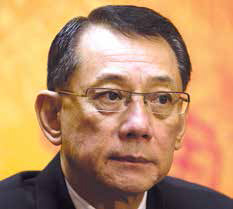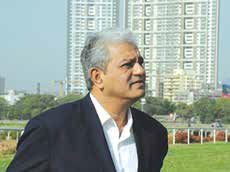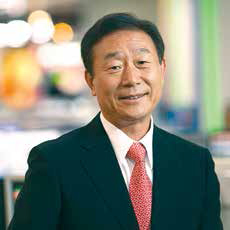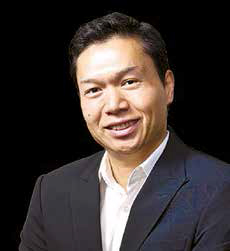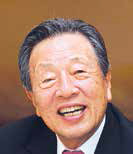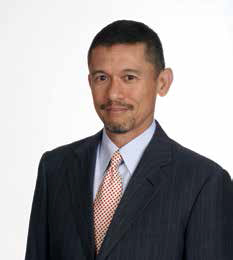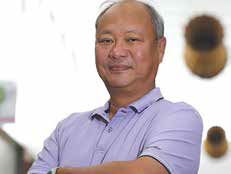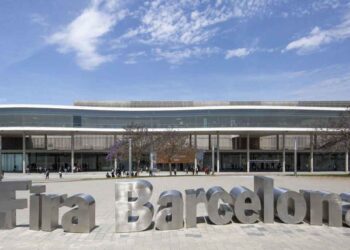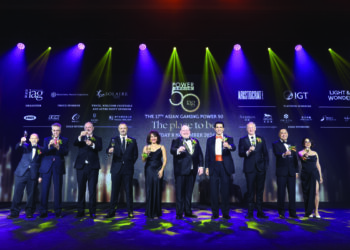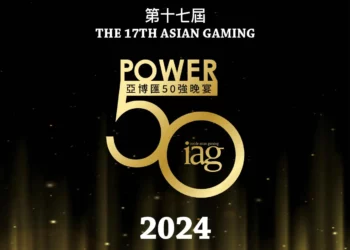41 Paul Steelman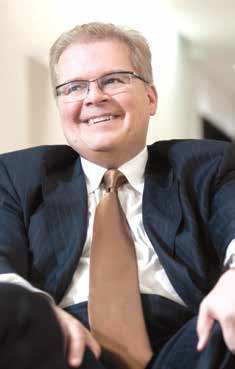
Founder and Principal
Steelman Partners
Paul Steelman likes light. Lots of light. He lavishes it on his spacious hotel lobbies and the archly contemporary restaurants he designs, it fills his wide, bright corridors, even his gaming rooms, where the windows can stretch from floor to ceiling.
The architect behind Sands Macao, Four Seasons Hotel Macao, Harrah’s Atlantic City, MGM Grand at Foxwoods, the Hard Rock at City of Dreams, Galaxy Macau, Solaire Resort & Casino in Manila and Vietnam’s newly opened The Grand – Ho Tram Strip probably has done more than anyone to lift casinos out of the dark ages—literally.
The impact of this has been profound. Mr Steelman talked a little about it earlier this year at the announcement of his most magnificent opportunity to date— Genting’s multibillion-dollar Resorts World Las Vegas, slated to open in 2016.
Casinos “ought to be a sketch of a journey,” he said. “We’re all homesick for places we’ve never been, and we want to deliver our guests to that place.”
The seeds of this were planted in the late ’80s before he struck out on his own, through his work with Golden Nugget and Mirage Resorts, and the influence of Steve Wynn, one of the great iconoclasts of casino design, is evident in his approach even now.
At various times he’s enunciated this as a set of “rules” that can be summarized by what he terms the “cocooning effect”—the layering of structures within structures, subdividing interior space in ways that makes it seem smaller and more personal. Curved pathways are integral to the effect, as is lighting and the employment of “art as light,” as he puts it, and the modular design of conference and meeting areas, function rooms, entertainment arenas and VIP salons. All have been widely emulated since, and with Las Vegas-based Steelman Partners having designed resorts in more than 30 countries—the firm currently is working on some 85 projects around the world—the effect has been to revolutionize the look of the modern gaming resort and how it functions as public space, how people move in and through it, how building and guest interact with their surroundings, inside and out. It has changed the way casinos feel and has gifted them in the process with an emotional range beyond what most of us would have thought possible even a decade ago.
42 Albert Yeung
Founder and Chairman
Emperor Group
Albert Yeung is the businessman who built the “casino paved with gold”. The lobby of the Grand Emperor Hotel & Casino in downtown Macau features a “Golden Pathway” with 78 gold bars, each weighing one kilogram, recessed in the floor under glass panels.
The feature aptly sums up Mr Yeung’s personality as a showman and show business entrepreneur. He counts Hong Kong and Hollywood actor Jackie Chan among his friends, with Mr Chan named as a minority shareholder in the Grand Emperor when it opened in January 2006.
The casino operates under a gaming license provided by Sociedade de Jogos de Macau. Gaming revenue in the 12 months ended 31st March was up 14% year on year to HK$1.86 billion (US$238 million), accounting for 91.5% of the revenue of Hong Kong-listed Emperor Entertainment Hotel.
The Emperor Group, based in Hong Kong, has become a regional player in entertainment and leisure, with ventures in Macau, China, Taiwan, Thailand and Indonesia, employing some 7,000 staff. It also notably operates a hotel and casino in the North Korean special economic zone of Rason, bordering China and Russia. The property, which according to the company was opened in 1999, was one of the first foreign businesses to make inroads in the isolated nation. Not much current information is available on the Rason casino, though it supposedly caters to Chinese and Russian contractors working in the area who pay a hefty entry fee to get in.
Mr Yeung’s official biography recounts that he started in business as a jewelry retailer with a single shop. From that foundation he expanded into property development and investment, financial services, entertainment and movies, hotels, publishing, catering and retailing.
No stranger to controversy, he has endured allegations of corruption and organized crime links to retain his position as one of the region’s wealthiest and most influential businessmen. He’s connected to a lot of powerful people, top officials in Beijing reputed to be among them.
Born in southern China’s Chiu Chow region, an area renowned for breeding “tough guys,” he collects luxury cars and proudly displays his wealth on expensive “lucky” number plates. He is also a high-profile philanthropist, supporting many mainland Chinese causes.
43 Jaydev Mody
Chairman
Delta Corp.
With the M.V. Horseshoe approved last month to start taking bets in Goa, there are now five casino cruises plying the lucrative waters off the western Indian state, and hotel and leisure giant Delta Corp. owns three of them.
Mumbai-based and -traded Delta has no intention of stopping there. The holdings the company has amassed under its charismatic 58-year-old chairman Jaydev Mody include residential and commercial real estate both at home and abroad, including several Mumbai landmarks, the city’s famed Crossroads mega-shopping mall among them. In the resort space, it owns the state of Daman’s largest tourist and convention hotel, three non-gaming tourist hotels in Goa, one of them an extravagant all-suite waterborne affair, and foreigners-only casinos in two tourist hotels in the Sri Lankan capital of Colombo.
The Goa casinos aren’t modest affairs either. Casino Royale, the state’s secondlargest gambling vessel, features 480 gaming positions on four decks, with separate VIP areas, its own helipad and a crèche and playroom for children. Casino Caravela contains 190 gaming positions on two decks, one of them private. The Horseshoe, a catamaran 87 meters long and containing 80 slot machines and about 100 gambling tables, was purchased from Caesars Entertainment for US$3 million to replace a much smaller boat.
Delta not only is India’s largest gaming operator, it is the only one in the country that is publicly traded, with a current market cap in US dollars of about $255 million and revenue from operations in the latest financial year of $77.6 million, $30 million of it from gaming.
Not surprisingly, Mr Mody likes the profit-making potential of casinos and believes there is plenty of appetite in South Asia for more of them.
In Daman, where the company holds a substantial equity interest in Advani Hotels & Resorts (India), owner and operator of the Ramada Caravela Beach Resort, plans are in the works to add a casino with up to 1,500 gambling positions to the company’s own Thunderbird resort complex. Mr Mody also is busily wooing officials for approval to open a second casino in Daman. He sees the state as the gaming hub for Mumbai with an immense opportunity to broaden its overall appeal as a domestic vacation destination.
In Sri Lanka, Delta intends to be an even bigger player, and its ambitions appear to dovetail with the government’s desire to leverage resort-scale gaming as an economic development tool. The company owns a sizable plot of land in Colombo and is looking for a partner or partners to join it in building something there of destination proportions.
44 Lam Man Pou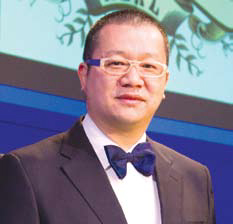
Founder and Chairman
Asia Entertainment & Resources Ltd
Lam Man Pou is leading Asia Entertainment & Resources down a path of managed expansion, adding two promoters to its junket network earlier this year and establishing a presence with casino giant Sociedade de Jogos de Macau for the first time through the acquisition of six VIP tables at SJM satellite Le Royal Arc Casino. He plans to cap these achievements with a dual listing on the Hong Kong Stock Exchange.
Amid the general slowdown in VIP volumes last year, AERL was tardy in joining its competitors in the switch from commission-based partnerships with the casinos to the revenue-sharing model the casinos prefer. Mr Lam’s focus ever since has been to minimize the company’s exposure to the risks that can impede growth over the long haul. He’s reined in credit and cut complimentaries to his agents for hotel rooms and other perks. To soften the blow he’s taken the novel approach of offering cash-only agents a piece of the win he shares with his casinos. It’s gutsy, and it hasn’t come without a price. Rolling chip turnover through the first half of this year was down 15%, and the acquisitions took a significant bite of net income, which was down 89% to US$4 million ($24.4 million on a non-GAAP basis).
But revenue-sharing has begun to pay off, and the company made money in the second quarter on hotel and other services charged to its agents. The momentum is expected to continue into the second half, with rolling chip turnover forecast to growto $19 billion for the year, and that’s not counting the L’ Arc tables.
The Hong Kong listing should be finalized before then. Mainland Chinese and Hong Kong investors have been calling for it, according to reports, and Mr Lam has high hopes for it. AERL, for all the challenges it’s faced, has enjoyed robust free-cash-flow yields that aren’t being fairly valued, as far as he’s concerned. Moreover, he believes locals understand better than American investors the swings in fortune that can characterize the high-roller trade. To signal his confidence he’s joined his management and a core of AERL shareholders in purchasing $60 million of the stock for the listing.
45 Yoji Sato
Chairman
Dynam Holdings
It’s the breadth of his vision as much as his business acumen that finds Japanese pachinko king Yoji Sato making his debut this year on “The Asian Gaming 50”.
With an eye on Macau’s burgeoning machine gaming market, Mr Sato’s Hong Kong-listed Dynam Holdings bought intoMacau Legend Development’s IPO earlier this year to the tune of HK$273 million, and if and when Japan legalizes casinos it’s expected he’ll be in the thick of things on the strengths of his mass-market savvy, his renown as a philanthropist and a Rolodex bulging with the names of friends in high places.
Interestingly, the 67-year-old was running supermarkets, not gaming parlors, when the death of his father in 1987 made him heir to two pachinko halls in Tokyo. Adapting what he’d learned in consumer retail he renamed the family firm, cut prices on his games and with his younger brother Kohei built the company into the second-largest player in the largest machine gaming market in the world, with 362 arcades and annual revenues surpassing US$1.5 billion.
“Our target was to build Dynam Japan like Wal-Mart,” he said in a recent interview.
Today, Kohei oversees operations (plans are to open 1,000 halls over the next decade) while Yoji maps an aggressive program of overseas expansion that kicked off in fitting style last August when Dynam went public as the first Japanese company to have its primary listing on the HKSE.
He believes pachinko has global potential as an entertainment proposition, a conviction he first tested several years ago in South Korea, where the game became such a sensation—the number of arcades ballooned to 7,000 in just one year—the government shut it down. He plans to replicate that success in Macau with his team from South Korea and a new generation of games featuring varying skill levels and other innovations. Dynam’s investment in Macau Legend is the springboard. Mr Sato expects to have pachinko in front of China’s gamblers within a year.
46 Clarence Chung
Chairman and CEO
Entertainment Gaming Asia
Nasdaq-listed Entertainment Gaming Asia (EGT) appears to be facing an uncertain future.
EGT, formerly Elixir Gaming Technologies, is a wholly owned subsidiary of Hong Konglisted Melco International Development, headed by Lawrence Ho, co-chairman of Macau casino juggernaut Melco Crown Entertainment.
From its roots as a supplier and thirdparty operator of machine games, EGT has been transforming itself into a developer of casinos in emerging markets, starting with a focus on Indochina. The company has two properties in Cambodia, both along the border with Thailand. There’s Dreamworld Pailin, with 26 tables and 58 electronic gaming machines, opened in May 2012, and Dreamworld Poipet, a slot club with 300 machines, which had a grand opening this May.
Revenue at Dreamworld Pailin in the second quarter of 2013 was US$907,000, down from $1.1million in Q1, owing to declining player traffic. The company concedes the property “has been slow to ramp up” and continues generating losses. EGT Chairman and CEO Clarence Chung hopes to turn things around by refocusing Dreamworld Pailin’s efforts on attracting VIP players rather than mass-market tour groups, reducing its table count in the process.
While the recently opened Dreamworld Poipet is still finding its stride, its prospects are buoyed by a low operating cost structure, with a mere $25 average daily win per unit required to achieve break-even EBITDA.
EGT also runs slot operations in thirdparty owned venues in Cambodia and the Philippines. Revenues in the Philippines have come under pressure from “increasing competition from the development of major integrated resorts in Manila,” according to the company. With several more Manila IRs set to open over the coming years, the outlook there looks bleak, despite EGT’s vague assertion that “This increase in competition will bring consolidation at the top-class level, and we believe this could provide an opportunity for us.”
The company’s slot operations at NagaWorld in Phnom Penh generated $3.7 million in the second quarter, constituting 63.2% of its total revenue. Average daily net win hit $256, up from $217 in Q1. The strong contribution from operations at NagaWorld helped mitigate the company’s poor performance elsewhere in the quarter.
But NagaWorld also presents the single biggest risk for EGT, which will see its agreement to run slots there expire in 2015. There is speculation that NagaWorld might not renew the agreement—it has already been adding significant numbers of machines not operated by EGT. Naga executives have also made no secret of their displeasure with EGT’s decision to open casinos of its own.
EGT also supplies high-security gaming chips and plaques under the Dolphin brand. The company relocated its production facility from Australia to Hong Kong in the second quarter, impacting profitability of that division in Q1, but with a near-term order pipeline of approximately $2 million, supplying chips could prove the company’s most reliable ongoing earner.
Mr Chung took over as CEO of EGT in October 2008. He has a strong background in management and finance, most recently as an investment banker at Lazard and a vice president of Pacific Century Group.
He and his company have been on a steep learning curve, running table games and operating self-owned venues. So far, the path to diversification has been a tough one, but the lessons they’re learning on the way could prove vital to their continued survival if EGT’s agreement with NagaWorld comes to an end in the next couple of years.
47 Winfred Yu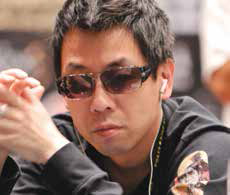
President
Kings Consulting
Poker pro, entrepreneur, marketeer, Winfred Yu has been a force in putting poker on the map in the world’s largest gambling market.
The Hong Kong native is founder and president of Kings Consulting, the company that partnered with junket giant Suncity Group to bring to Macau perhaps its bestknown poker venue, Poker King Club, located at StarWorld Hotel & Casino, home of the “Big Game,” where whales normally found at the city’s high-stakes baccarat tables vie with the elite of the sport for pots in the tens of millions.
Poker King Club is fitted with all the comforts and services a high roller would expect. But the genius of the concept as Mr Yu has set it up is that it’s open to all. Average players will find limits they can afford and the only regular sit-and-go tournaments in town. They also enjoy a casino-style rewards program that’s unique in the business, where as members they can accumulate points good for gifts and services such as ferry tickets, hotel rooms, food and beverage vouchers and branded merchandise.
It’s a model Mr Yu and Suncity believe has legs throughout the region. It’s designed along the lines of a sports book. Poker King Club manages, staffs and promotes the room in exchange for a fee, which is great for StarWorld and great for local players, who get a shot at a game they can afford in a world-class venue, and with the likes of Phil Ivey, Johnny Chan, Sam Trickett, Gus Hansen and John Juanda checking in from time to time, a chance to see the best on the planet in action.
But its biggest selling point is Mr Yu himself. A fixture on the global tournament circuit, he’s the second-winningest player in Hong Kong history. On the all-time money list he’s in the top 1%. It’s the kind of credibility that has secured for Poker King Club official host status on the Asian Poker Tour and delivered last year’s HK$2 million buy-in Macau High Stakes Challenge. Sponsored by another big-time junket, Neptune Group, the tournament offered a breathtaking prize pool of more than HK$300 million and paid out a first prize in excess of $50 million, the largest for a single day of poker ever.
48 Han Chang-woo
Chairman and CEO
Maruhan Group
Japan’s primary speculative pastime is pachinko, a form of quasi-gambling played on pinball-style machines that generates about US$36 billion annually in revenue.
More than 4,000 companies manage some 12,300 pachinko parlors across the country, and by far the biggest earner among them is Maruhan Corp., which in the 12 months ended 31st March generated the equivalent of $21.5 billion in sales, a year-on-year increase of 2.8%, across 286 venues. The estimated $3.4 billion fortune of Maruhan’s self-made founder, Korean-born Han Chang-woo, landed him in eighth place this year on Forbes’ “Japan’s 50 Richest” list, emblematic of an industry which owing to its disrepute among Japan’s commercial elite is dominated by ethnic Koreans, especially on the operations side. Maruhan was set up in 1953 and incorporated in 1957. As Japan prospered in the post-World War II era, pachinko also thrived, and Mr Han did well enough in the ’60s to diversify into bowling alleys, driving ranges for golfers, amusement facilities, cinemas and other leisure-related businesses. In the 1970s, he returned his focus to pachinko and rode the wave of the country’s ’80s economic boom, which left him well-positioned to take advantage of the long slide that followed, when he continued to build the company by exploiting the decline in asset prices to increase Maruhan’s market share.
While Japan still struggles to regain its economic legs, Maruhan Corp. prospers. Mr Han, now 82, has expanded his reach into more centralized locations. He’s built multi-story emporiums that lure customers with innovations that include non-smoking sections, free parking and improved odds. The cash flow from these large, successful outlets has helped transform Maruhan into the conglomerate it is today. The company’s Maruhan Japan Bank subsidiary has been expanding in Cambodia, Myanmar and Laos. Until this year, Maruhan held a minority interest in Macau’s Ponte 16 casino.
The revenue the company generates in Japan suggests an enormous untapped demand for purer forms of gambling. The advent of legal casinos would not necessarily sound the death knell for pachinko, however. If anything, the game is so ingrained in the national psyche, it’s likely not only to endure alongside any future Japanese casinos, it may even influence their design.
49 Dennis Valdes
President
PhilWeb Corp.
PhilWeb hopes to expand its online business to at least six countries across the Asia-Pacific region over the coming months.
The Philippines-based operator, whose far-flung activities include scratch cards, sweepstakes and Web gambling, is eyeing Thailand, Myanmar, Sri Lanka, Palau, Nepal and Mongolia in a bid to grow the international segment of its revenues, which currently comprises about 9% of the total.
“Asia in general is booming,” President Dennis Valdes said earlier this year in announcing a 20% increase in net profit for 2012 on PHP1.5 billion in revenues (US$450 million), a 27% increase.
He is bullish as well about the company’s domestic prospects, despite the growth of land-based competition.
“We found that the gamers are very different,” he said at the earnings announcement. “You see in our track record on revenue that there has been no effect on e-games. The reason for that is that Resorts World Manila and Solaire are in a very small section of the entire country, which is the city of Manila and Paranaque, while e-games is in every island.”
PhilWeb operates some 277 Internet gaming cafes nationwide—the “7-11 of gaming,” as Mr Valdes characterizes them. “It’s your corner convenience store.”
On the other hand, it is a difficult country to call when it comes to predicting how politics will affect the prospects of companies like PhilWeb. Calls to outlaw Internet cafes, which have been heard for years, continue to resound among Philippine politicians and lawmakers. This is also true overseas, in Guam, for example, where Web gambling, and PhilWeb, have found themselves in the crosshairs of a prominent senator.
Such regulatory risks will continue as the company pursues its aggressive plan of regional expansion, although it appears to have enough irons in the fire to mitigate the fallout of negative political developments in any single jurisdiction.
Last month, PhilWeb landed on Forbes Asia’s roster of 200 best up-and-coming companies for 2013, the only Philippine company to receive that honor. It has also been on the magazine’s list of top Asian companies with less than $1 billion in market capitalization for four straight years.
50 Tony Fung
Chairman and Founder
Yu Ming Investments
The Macau integrated resort model offers a compelling proposition for jurisdictions seeking to attract hordes of Chinese tourists.
Tony Fung believes Australia’s far north is the ideal place to transplant that model. “I am looking at Macau and so are others— everyone is looking at how to take a piece of the Macau pie,” he says.
The 61-year-old billionaire scion of one of Hong Kong’s best-known financial services families is pitching an A$4.2 billion gaming and entertainment mini-city near the Queensland city of Cairns, Aquis Great Barrier Reef Resort it’s called, and it will dwarf anything they’ve ever seen Down Under.
Speaking recently to The Australian Financial Review, he explained one of the area’s major appeals to Chinese travelers seeking a punt overseas: “I think it will be an easy sell for us. You see, if you go to Macau your colleagues think you are a gambler. If you go to Singapore they think you are a gambler. But if you say you are going to Cairns and the Great Barrier Reef, then you are still a family man.”
Mr Fung has purchased an option through a local company he controls on about 300 hectares of farmland some 13 kilometers north of Cairns in a seaside hamlet called Yorkeys Knob. Here he wants to build five hotels totaling 3,750 rooms and 1,335 apartments and luxury villas, plus a golf course, a 25,000-seat sports stadium, two theaters, 13,500 square meters of highend retail, a lake and a reef lagoon and oneof the world’s largest aquariums. Initial plans call for 750 table games and 1,500 slot machines. He is shooting for a 2018 opening.
Cairns is home to one gaming venue already, the Reef Hotel Casino, owned by Reef Casino Trust, but its exclusive license expired a few years ago, and Mr Fung, with 15 years of Queensland investment experience under his belt and holdings that include shopping malls, residential and commercial property and real estate in China and the United States, has timed his proposal at a juncture when foreign tourism has become a policy priority across Australia. Asians, thecountry’s largest contingent of visitors, are the primary focus, especially the Chinese, the country’s fastest-growing source of inbound tourism.
Mr Fung now faces the more challenging task of getting his proposal approved. Though local environmental and community groups are already voicing their opposition, state officials appear to be enamored of the idea, and of Mr Fung, a son of one of the founders of Sun Hung Kai & Co. and a former chairman of SHKI Group and the man credited with building the Hong Kong Convention and Exhibition Centre. They especially like the part about the 9,000 construction jobs and 10,000 fulltime positions once the resort is open, and they have streamlined the review process by declaring it a “coordinated project,” which means they will look in full at the plan, enabling Mr Fung to avoid having to seek separate approvals for different parts of the proposal.
Next: About the Associate Sponsors







